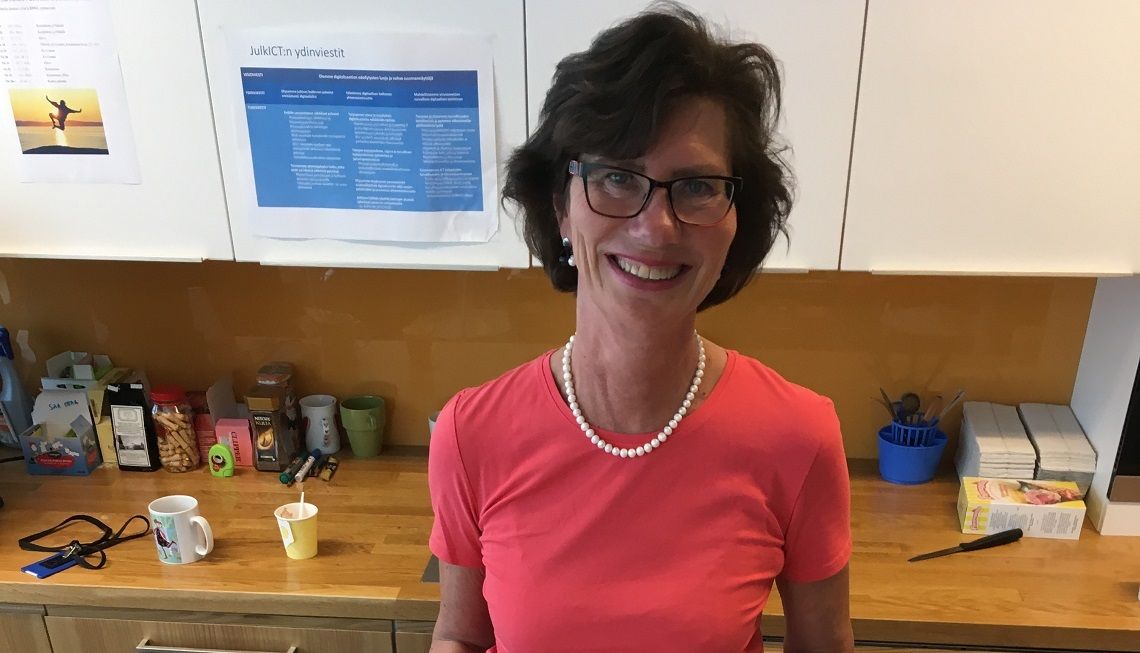Anna-Maija Karjalainen, Director General of Public Sector ICT, Ministry of Finance, Finland
By Chia Jie Lin
Women in GovTech 2018 Special Report.

My responsibility is to digitalise the public sector. Our work is to define enabling legislation, to create principles and guidelines, to ensure resources and to steer the public sector to digitalise more. And not to forget those who are not able to use digital services.
We have implemented the national service architecture (based on the Estonian X-road) that gives citizens one-stop shop to the governmental digital services, provides strong eID and enables the citizens to exchange information in a secure way with government agencies. The authorisation tool enables one to authorise another person to take care of your personal matters or company duties.
What has been the most exciting thing that you worked on in 2018?
In my own department, we started to learn how to use the Lean methodology to solve complex matters. We wanted more visibility on what is ongoing in order to prioritise, get the most important work to flow fast, and gain more throughput. We trained the management team and the whole department in order to understand what are the good practices that we could copy to our work. Even though Lean method is traditionally used for the manufacturing work, it can be used also for the work of IT specialists, and even for the ministry.
We now have a Kanban wall in weekly use and we are learning how we can improve the workflow and prioritise better what we should do.
We also used the government’s internal product design consultants to help us to better define our annual goals, which previously did not seem to connect to the specialists’ daily work. The 2019 goals are now defined in this new way. We will see next year how this new process has helped us all to target a common goal.
If you were to share one piece of advice that you learned in 2018, what would it be?
How important it is to explain ICT and technical matters so that everyone can understand how citizens benefit from technological development. Putting the citizen in the center of the digitalisation work is not easy as we civil servants are rather used to considering the efficiency and costs savings.
What tool or technique particularly interests you for 2019?
I am interested to see how blockchain moves forward in the next year: what steps are other governments taking and how do we get our own plans implemented?
The other technique is AI. We are moving fast to deploy artificial intelligence to public sector services. With intelligent (AI) services we want to empower people to take care of their own well-being in different life events. For this we use the PPPP model - meaning Public, Private, People, Partnership. Also to help people to understand their own well-being, we are working on a digital twin concept.
What are your priorities for 2019?
Our priority is to finalise current government targets in the spring time. We will have parliament elections next spring in Finland. So we are preparing our plans and views on what the next government could consider having in their programme.
We have just finalised the report 'Ethical information management in the age of articifial intelligence' and the government has sent it to the parliament for discussion. The first discussion in the parliament was very positive and supportive. The ethics as well as citizen education were in the focus in the discussion. Our aim is that information policy would become a policy itself. The ethics of AI have been raised in public discussion so we want to be ready both for the discussion but also to the implementation of AI.
What is one skill that has helped you the most throughout the course of your career?
What has helped me is my social skills. I like to work together with other people and I am curious to learn new ways to do things in order to copy best practices. I also enjoy seeing the success of the people who directly report to me. Actually when I was chosen to work in the government nine years ago, I got the task due to my social skills (I have worked over 20 years in the private sector).
What advancements do you predict will happen in your field in the next ten years?
I think AI will help us in various ways in our daily lives. A digital twin will support people in the varying life events. AI will support in decision making (like proposals for doctors) and people can use more time for person to person work (ie. more hands supporting the elderly and disabled).
AI could help in legislation work in seeing the interconnections and help in standard changes. Lawyers are needed to define what changes need to be done and why.
Remote work will be even easier to practice and it will be strongly supported. We do not call it “remote” work any more, but consider it as normal work. We do get new collaboration tools to support us in cooperation and being present even while being remote.
Coffee, yoga, music… what powers you through your day?
Coffee is my power in the mornings as I am not a morning person. Otherwise, my power comes from the great people and specialists that I have in my department whom I am proud of.
I also look forward to the hobbies that I know I can practice in the evenings and on the weekends. I like flying small planes as a pilot and in the summer, boating on the lake. They both give me a feeling of freedom and give me power for the next working days.